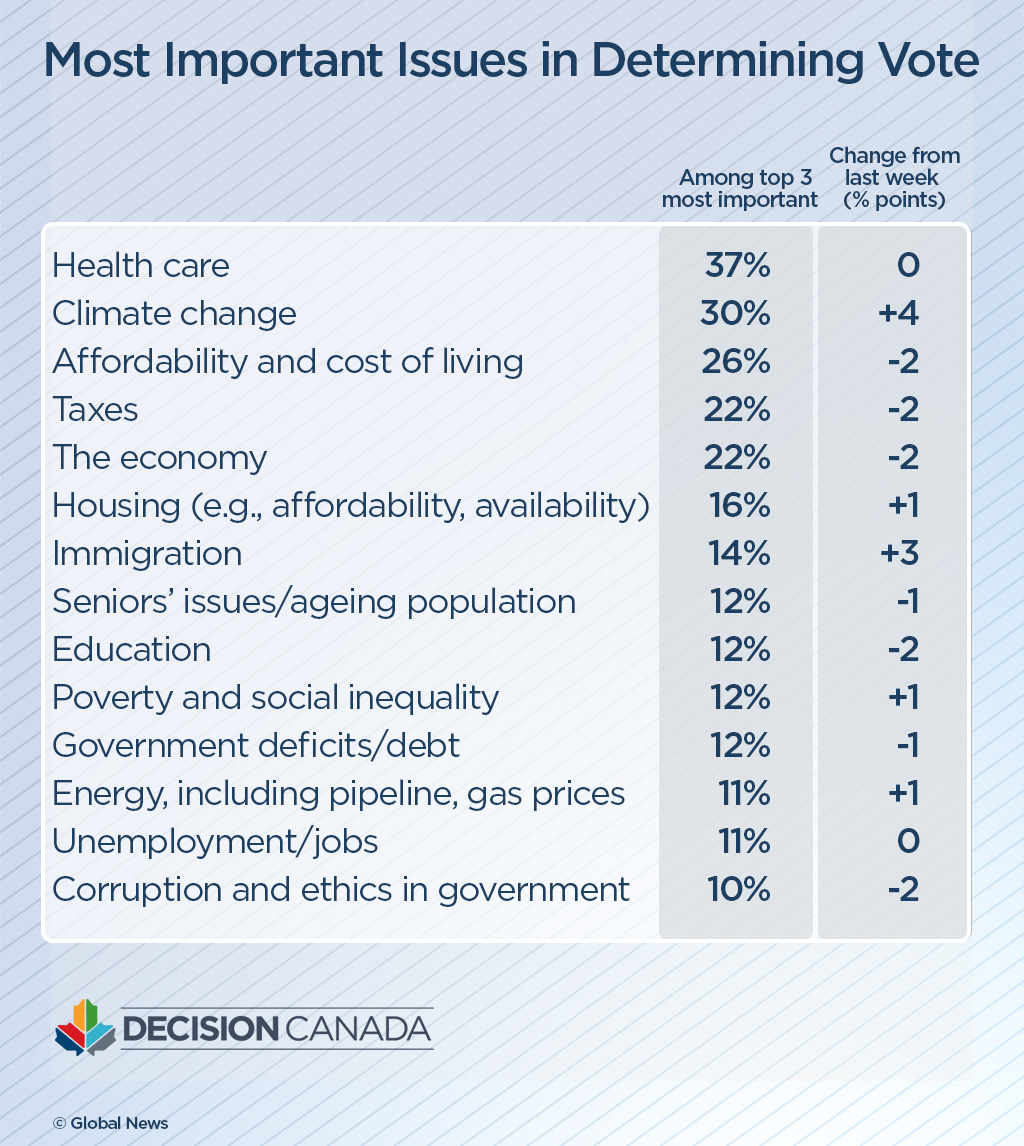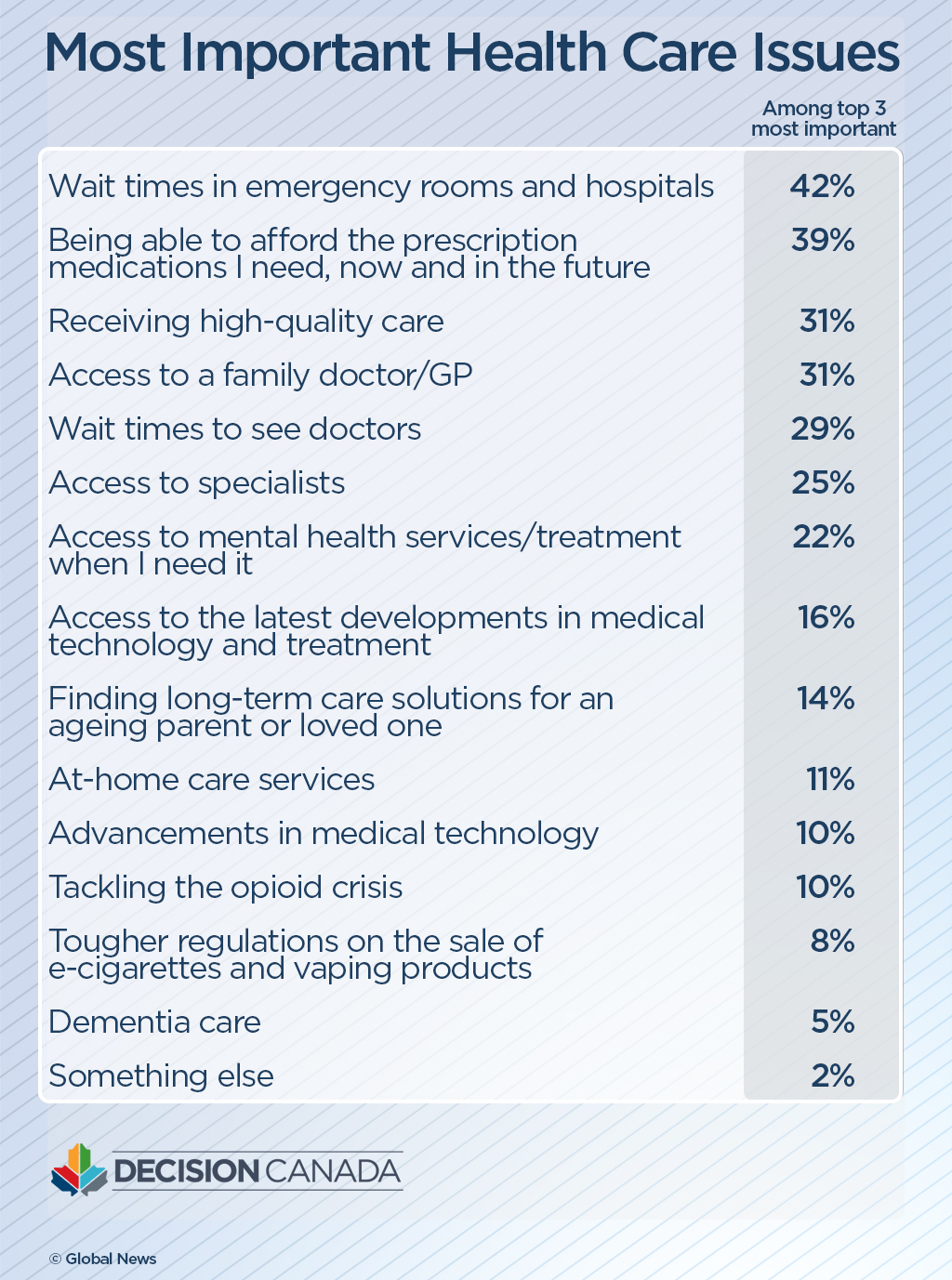Canadians are concerned about health care more than any other election issue, a new Ipsos poll suggests, but nearly half aren’t willing to pay higher taxes in order to improve the system.

The poll, conducted on behalf of Global News, found that for 37 per cent of respondents, health care is among the top three most important issues in deciding whom they’ll vote for in the upcoming federal election.
COMMENTARY: Pharmacare is a popular idea — so where do the parties stand?
The issue was of greater concern than climate change (30 per cent), the cost of living (26 per cent) and taxes (22 per cent), the poll found.
On average, respondents said they would agree to pay an extra $238 per year in taxes for improved health care, but that number includes 47 per cent of Canadians who said they are unwilling to fork over another cent.
While half of the population is willing to pay more in taxes, it’s not enough to make much of a difference, Bricker added.
A few hundred dollars would represent a small fraction of what health care currently costs per person. An average of $3,993 was spent by governments in 2016, according to the Canadian Institute for Health Information.

Get daily National news
The question of taxes exposed a gap in attitudes among the generations. Those aged 18-34 were willing to pay more ($354) on average than those aged 35 to 54 ($209) as well as those over 55 ($182), the poll found.
Bricker said seniors may be on fixed incomes and feel they’ve already paid their dues.
“They spent a lifetime paying for taxes to support the health care system,” Bricker said.
The poll, conducted between Sept. 27 and 30, also dove into specific issues within the health care system.
Wait times at hospitals and emergency rooms topped the list, with 42 per cent of respondents putting those issues in their top three.
- Real Canadian Superstore fined for ‘misleading’ Product of Canada displays
- ‘No reason to continue discussing’: Ontario mayor wants Andrew’s name dropped
- Canada opens new residency paths for military recruits, other workers
- Danielle Smith promises Alberta referendum over immigration, Constitution changes
The affordability of prescription drugs was the second most-cited concern, followed by receiving high-quality care, access to family doctors and wait times to see a physician.
Seventy-two per cent of respondents disagreed that Canada’s health care system is able to cope with the aging population. And nearly 90 per cent agreed that action is required to make sure the system doesn’t suffer as the country gets older.
But when it comes to solutions to the issues within the system, one thing was clear — Canadians don’t have much of an appetite for so-called two-tier healthcare.
Ipsos found that just six per cent think adding more private health care, which could potentially alleviate some strain on the public system, is the best way to fund a “sustainable” system in the future.
In order to improve health care, respondents favoured other measures. Forty-three per cent supported giving greater responsibility to health care professionals like nurses and pharmacists, and 22 per cent said there should be a greater focus on prevention and healthy living.
At the same time, the vast majority of respondents, 84 per cent, were in favour of increasing privatization if it meant there were more doctors in the public health care system in their province.
These are some of the findings of an Ipsos poll conducted between Sept. 27 and 30, 2019, on behalf of Global News.
For this survey, a sample of n = 1,489 Canadians aged 18+ was interviewed online via the Ipsos I-Say panel and non-panel sources. Respondents earn a nominal incentive for their participation. Quotas and weighting were employed to balance demographics to ensure that the sample’s composition reflects that of the adult population according to Census data and to provide results intended to approximate the sample universe (weighting efficiency = 63.9 per cent). The precision of Ipsos polls which include non-probability sampling is measured using a credibility interval. In this case, the poll is accurate to within ± 2.9 percentage points, 19 times out of 20, had all Canadians been polled. The credibility interval will be wider among subsets of the population. All sample surveys and polls may be subject to other sources of error, including, but not limited to coverage error, and measurement error. Ipsos abides by the disclosure standards established by the CRIC, found here: https://canadianresearchinsightscouncil.ca/standards/



















Comments
Want to discuss? Please read our Commenting Policy first.